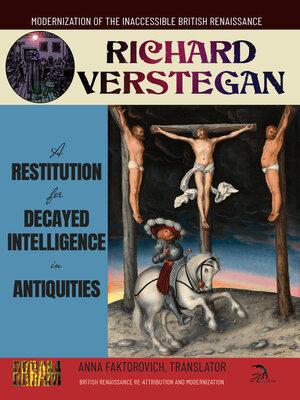A Restitution for Decayed Intelligence in Antiquities
ebook ∣ British Renaissance Re-Attribution and Modernization, Volume 18 · British Renaissance Re-Attribution and Modernization
By Richard Verstegan

Sign up to save your library
With an OverDrive account, you can save your favorite libraries for at-a-glance information about availability. Find out more about OverDrive accounts.
Find this title in Libby, the library reading app by OverDrive.



Search for a digital library with this title
Title found at these libraries:
| Library Name | Distance |
|---|---|
| Loading... |
The launch of Britain's "Anglo-Saxon" origin-myth and the first Old English etymological dictionary. This is the only book in human history that presents a confessional description of criminal forgery that fraudulently introduced the legendary version of British history that continues to be repeated in modern textbooks. Richard Verstegan was the dominant artist and publisher in the British Ghostwriting Workshop that monopolized the print industry across a century. Scholars have previously described him as a professional goldsmith and exiled Catholic-propaganda publisher, but these qualifications merely prepared him to become a history forger and multi-sided theopolitical manipulator. The BRRAM series' computational-linguistic method attributes most of the British Renaissance's theological output, including the translation of the King James Bible, to Verstegan as its ghostwriter. Beyond providing handwriting analysis and documentary proof that Verstegan was the ghostwriter behind various otherwise bylined history-changing texts, this translation of Verstegan's self-attributed Restitution presents an accessible version of a book that is essential to understanding the path history took to our modern world. On the surface, Restitution is the first dictionary of Old English, and has been credited as the text that established Verstegan as the founder of "Anglo-Saxon" studies. The "Exordium" reveals a much deeper significance behind these firsts by juxtaposing them against Verstegan's letters and the history of the publication of the earliest Old English texts to be printed starting in 1565 (at the same time when Verstegan began his studies at Oxford). Verstegan is reinterpreted as the dominant forger and (self)-translator of these frequently non-existent manuscripts, whereas credit for these Old English translations has been erroneously assigned to puffed bylines such as Archbishop Parker and the Learned Camden's Society of Antiquaries. When Verstegan's motives are overlayed on this history, the term "Anglo-Saxon" is clarified as part of a Dutch-German propaganda campaign that aimed to overpower Britain by suggesting it was historically an Old German-speaking extension of Germany's Catholic Holy Roman Empire. These ideas regarding a "pure" German race began with the myth of a European unified origin-myth, with their ancestry stemming from Tuisco, shortly after the biblical fall of Babel; Tuisco is described variedly as a tribal founder or as an idolatrous god on whom the term Teutonic is based. This chosen-people European origin-myth was used across the colonial era to convince colonized people of the superiority of their colonizers. And the Germanic theological legend that Verstegan imagines about Old German deities such as Thor (Zeus: thunder), Friga (Venus: love) and Seater (Saturn) is explained as part of an ancient attempt by empires to demonize colonized cultures, when in fact references to these deities were merely variants of the Greco-Roman deities' names that resulted from a degradation of Vulgar Latin into early European languages. Translations of the earlier brief versions of these legends from Saxo (1534; 1234?), John the Great (1554) and Olaus the Great (1555) shows how each subsequent "history" adds new and contradictory fictitious details, while claiming the existence of the preceding sources proves their veracity. This study also questions the underlying timeline of British history, proposing instead that DNA evidence for modern-Britons indicates most of them were Dutch-Germans who migrated during Emperor Otto I's reign (962-973) when Germany first gained control over the Holy Roman Empire, and not in 477, as the legend of Hengist and Horsa (as Verstegan...







